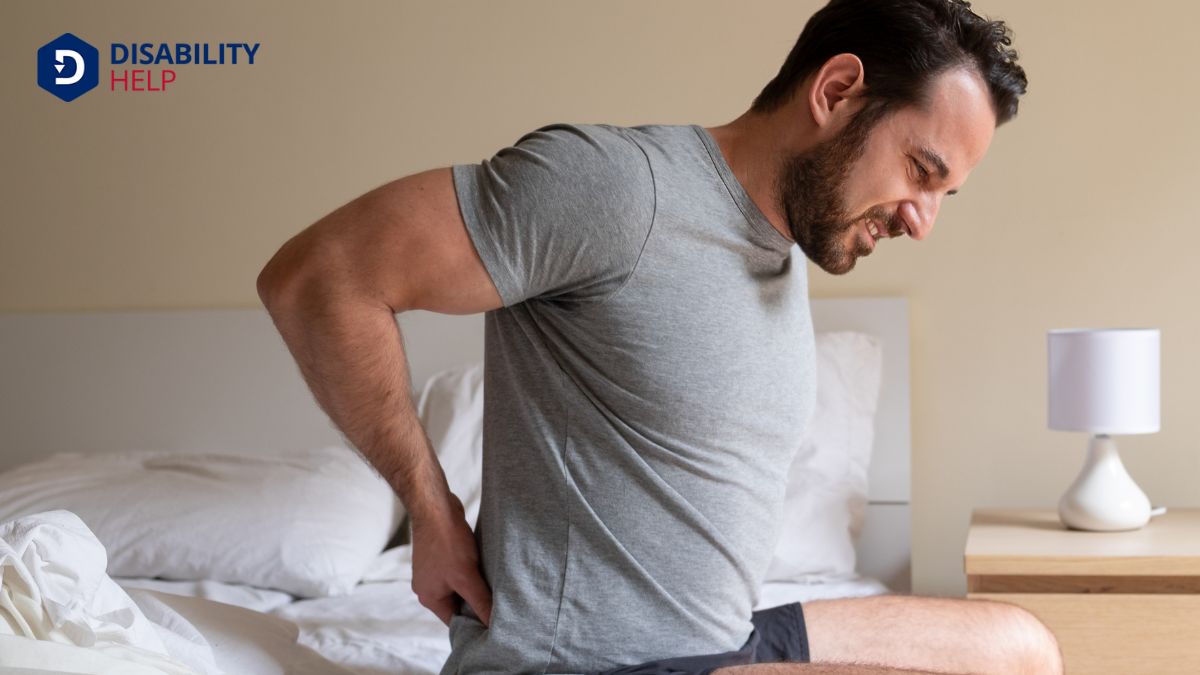When considering VA disability, we should understand that back pain can be accompanied by several secondary conditions. These include nerve damage and neuropathy, causing tingling or numbness, and sciatica, where pain radiates down the legs. Musculoskeletal disorders like arthritisInflammation of the joints, leading to pain, stiffness, and limited movement. or bursitis often exacerbate issues. Chronic back pain may also lead to mental health challenges such as depressionA mental health condition marked by persistent feelings of sadness and loss of interest. or anxiety, impacting overall well-being. Additionally, gastrointestinal issues can arise from stress and medication. It's important to recognize these connections to effectively strengthen a VA disability claim. Let's explore these conditions further to gain a deeper understanding.
Key Takeaways
- Nerve damage and neuropathy often accompany back pain, causing sensations like tingling, numbness, and shooting pains.
- Sciatica and radiculopathy result from nerve compression, causing pain and numbness radiating down the legs.
- Musculoskeletal disorders such as arthritis and tendonitis complicate chronic back pain and affect daily tasks.
- Chronic back pain can lead to mental health issues like depression, anxiety, and sleep disturbances.
- Gastrointestinal issues, including IBS and acid reflux, can be exacerbated by chronic back pain and related stress.
Nerve Damage and Neuropathy

Nerve damage and neuropathy often accompany back pain, adding complexity to disability claims with the VA. When we experience these conditions, it can feel like a constant battle against sensations like tingling, numbness, and even sharp, shooting pains. Our nerves, which should smoothly transmit signals from our brain to the rest of our body, start sending erratic or incorrect messages. This interference not only affects our physical well-being but also our ability to perform daily tasks, impacting our quality of life.
When filing a VA disability claim, it's important to understand how nerve damage and neuropathy connect to our back pain. The VA considers these as secondary conditions, meaning they're directly linked to an existing service-related injury or illness. To strengthen our claim, we need to provide clear medical evidence showing this connection. Detailed documentation from our healthcare providers can demonstrate how our back issues have led to neurological complications.
Navigating the VA disability process can be overwhelming, but understanding how our conditions interrelate is key. By clearly presenting how nerve damage and neuropathy stem from our back pain, we improve our chances of securing the benefits we deserve. Let's make sure we advocate effectively for our health and rights.
Sciatica and Radiculopathy
Sciatica and radiculopathy, like unwelcome companions, often accompany back pain, creating additional challenges in our daily lives and VA disability claims. These conditions stem from nerve compression, usually in the lower back, leading to pain that radiates down the legs. As veterans maneuvering through the VA disability system, understanding how these conditions affect us is essential.
When we experience sciatica or radiculopathy, we might notice:
- Pain and Discomfort: A sharp, burning pain traveling down one leg, often making it difficult to sit or stand for long periods.
- Numbness and Weakness: A loss of sensation or strength in the affected leg, which can affect our balance and mobility.
- Impact on Daily Activities: Simple tasks like walking or climbing stairs become challenging hurdles, affecting our overall quality of life.
These symptoms aren't just physical; they can impact our mental well-being, too. The constant discomfort and limitations can lead to frustration and stress.
In our journey to seek VA disability benefitsFinancial assistance provided to individuals who are unable to work due to a disability, such as Soc..., it's crucial to document how sciatica and radiculopathy exacerbate our back pain. By clearly illustrating this link, we can strengthen our claims. Let's make sure we're prepared and informed, advocating effectively for the support we need.
Musculoskeletal Disorders
Musculoskeletal disorders often complicate our battle with back pain, adding layers of difficulty to our daily routines and VA disability claims. These disorders, which include conditions like arthritis, tendonitis, and bursitis, frequently accompany or result from chronic back pain. They can create a cycle of discomfort that makes it tough to perform even simple tasks. For veterans dealing with these issues, understanding how musculoskeletal disorders intertwine with back pain is vital for obtaining the proper VA disability benefits.
When we experience back pain, our bodies may compensate by altering posture or the way we move. This can lead to strain on other joints and muscles, exacerbating existing musculoskeletal conditions or even causing new ones.
For instance, arthritis might flare up in response to changes in posture, or tendonitis might develop from overcompensation in certain muscles. Recognizing these connections is important when we're filing for disability claims, as these secondary conditions can greatly impact our overall health and quality of life.
Mental Health Impacts

While musculoskeletal disorders complicate the physical aspects of back pain, we can't overlook the profound impact this pain can have on our mental health. Chronic back pain doesn't just cause discomfort; it can also take a significant toll on our emotional well-being. Many of us may find that this persistent pain leads to feelings of frustration, anxiety, and even depression. It's crucial to recognize these mental health impacts as they often occur alongside physical symptoms and can greatly affect our quality of life.
Here are three key mental health impacts of chronic back pain:
- Depression: Dealing with constant pain can make us feel hopeless or helpless, leading to a decrease in motivation and enjoyment in activities we once loved.
- Anxiety: The unpredictability of back pain flare-ups can create a state of constant worry, making it difficult to relax or focus on daily tasks.
- Sleep Disturbances: Pain can interfere with our ability to get restful sleep, exacerbating feelings of irritability and stress.
Understanding these mental health impacts helps us better advocate for thorough treatment options that address both our physical and emotional needs. Recognizing these conditions is essential in seeking appropriate support and improving our overall well-being.
Gastrointestinal Issues
Let's explore the gastrointestinal issues that often accompany chronic back pain. When we experience persistent back pain, it can lead to a cascade of other health concerns, including those affecting our digestive system. The connection may not be immediately apparent, but it's important to recognize how these issues are interlinked.
Chronic back pain often results in limited mobility and increased stress, both of which can disrupt normal digestive processes. Stress, in particular, plays a significant role by potentially exacerbating conditions like irritable bowel syndrome (IBS) or acid reflux. Our bodies are interconnected, and when one part is in distress, others can be affected, too.
Moreover, the pain medications we might rely on can have side effects that impact our gastrointestinal health. Nonsteroidal anti-inflammatory drugs (NSAIDs), commonly used to manage back pain, can irritate the stomach lining and lead to ulcers or gastritis.
Opioids, another class of pain medication, can slow down the digestive system, resulting in constipation.
Understanding this connection helps us manage our health more effectively. By recognizing these potential issues, we can work with healthcare providers to address both our back pain and any accompanying gastrointestinal challenges, ensuring a more thorough approach to our well-being.
Conclusion
To sum up, we've delved into how back pain can lead to various secondary conditions that may qualify for VA disability benefits. Nerve damage, sciatica, musculoskeletal disorders, mental health impacts, and even gastrointestinal issues can all stem from chronic back pain. It's important for veterans to understand these connections, as they can greatly impact their quality of life. We encourage you to seek medical advice and support, ensuring you receive the benefits and care you deserve.






